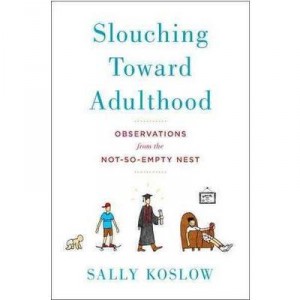The Adultescent Phase
July 14th, 2012 // 3:15 pm @ Oliver DeMille
 With more and more college graduates returning home to live with their parents, many adults are becoming frustrated with the rising generation.
With more and more college graduates returning home to live with their parents, many adults are becoming frustrated with the rising generation.
In the book Slouching Toward Adulthood, Sally Koslow shows how this trend is the natural result of the last two generations of parenting.
The problem is not so much the slumped economy and high unemployment, although these are realities, but the fact that using student loans to get through college is now the norm, so when students graduate they are loaded with debt and many can’t afford rent.
Even more difficult, the Boomer generation tended to bring up their children with an attitude that left little room for the lessons learned from failure.
This was mixed with a strangely controlling approach to scheduling and achievement.
As reviewer Judith Newman wrote in People (July 9, 2012):
“Recognize that channel-surfing, chips-snacking lump on the couch? It might well be your adult child. Koslow writes wittily about the infantilization of American youth as increasing numbers treat getting a job and moving out as just an option. The solution? Stop trying to inculcate our kids against failure, for starters.”
Koslow wrote the book in response to frustrations with her own sons.
One of them was a college graduate, twenty-five year old in her home who frequently slept until noon and then played with friends for the rest of the day and most of the night.
Over six million adult children now live with their parents, pay no rent, eat without limits from their parents’ fridge, and use the house, yard, cable and computers without paying for them.
Many consider their parents an ATM.
Moreover, very few of them are out actively seeking employment.
The irony, Koslow notes, is that most of these adults were raised in a culture where they were constantly told they were special.
The result is that they value having fun with friends, want to travel extensively, and look down on working for the money to pay for their lives, hobbies and interests.
Many of the generation see themselves as free spirits, but unlike the sixties generation they want the expensive yuppie lifestyles of freeloaders.
As Diedre Donahue put it in USA Today,
“The adults aren’t helping. Koslow believes parents often infantilize their adult children because it makes parents feel needed. The result: entitled but incompetent children and exploited but enabling adults.”
Of course, this doesn’t describe the entire generation, or even a majority of them, but it does accurately depict far too many.
This new adultescent trend, as Koslow calls it, doesn’t show any likelihood of slowing in the years ahead. If anything, it will likely increase.
Koslow writes of her own generation, the parents:
“The boomer generation, with its idiomatic immaturity and fury at the very idea that we have to age, is in no small part to blame for adultescents feeling as if there will always be time to break up with one more partner or employer, to search for someone or something better, to get another degree or to surf another couch, to wait around to reproduce.
“Thanks to our parents listening to Dr. Benjamin Spock and to us sucking up to TV ads that pandered to our kiddie greed, we established the model of unprecedented self-involvement, enhanced by our ceaseless boasting.”
As if that’s not enough, the new generation of adultescents “…crave attention and often cash from parents, whom they frequently ask to help them move from place to place; create a mess; rack up debt…”
Then, all too often, they blame their parents for their plight, anxiety, and lack of opportunity.
Koslow’s own sons have now moved away from home and on to adult lives, much to the relief of any reader who has adult children, and in most cases the adultescent phase does eventually pass even if it takes about a decade longer than it used to.
The Boomer system of consistent coddling has borne dismal results.
Sadly, the Tiger Mom approach to forced excellence and settling for nothing but top achievement also often results in adultescentism.
In contrast, helping young people take responsibility for their own learning, careers and lives right from the beginning pays off when they are adults.
Leadership education works.
The economy is difficult, jobs are scarcer than in three generations, and the feelings of youth entitlement at are a century (perhaps all-time) high.
But those with a leadership education know that they have a life mission and need to use initiative, innovation, ingenuity and tenacity to rise to their potential.
They may still want to join their generation and experience an adultescent phase, but in most cases it will be much shorter than that of their peers.
Maybe the best thing about this book is that it is all shared with a hilarious sense of humor. It’s not stressful, it’s fun.
So smile and enjoy your adult kids’ time with you. Give them real chores and rules in the home.
It’s your home, after all.
The key to helping the kids become adults is to be one yourself.
Oh, and charge them rent or have them work it off in equivalent ways. They’re adults, and treating them like it is a sign of respect.
***********************************
 Oliver DeMille is the chairman of the Center for Social Leadership and co-creator of Thomas Jefferson Education.
Oliver DeMille is the chairman of the Center for Social Leadership and co-creator of Thomas Jefferson Education.
He is the author of A Thomas Jefferson Education: Teaching a Generation of Leaders for the 21st Century, and The Coming Aristocracy: Education & the Future of Freedom.
Oliver is dedicated to promoting freedom through leadership education. He and his wife Rachel are raising their eight children in Cedar City, Utah.
Category : Blog &Book Reviews &Culture &Family &Featured &Generations











